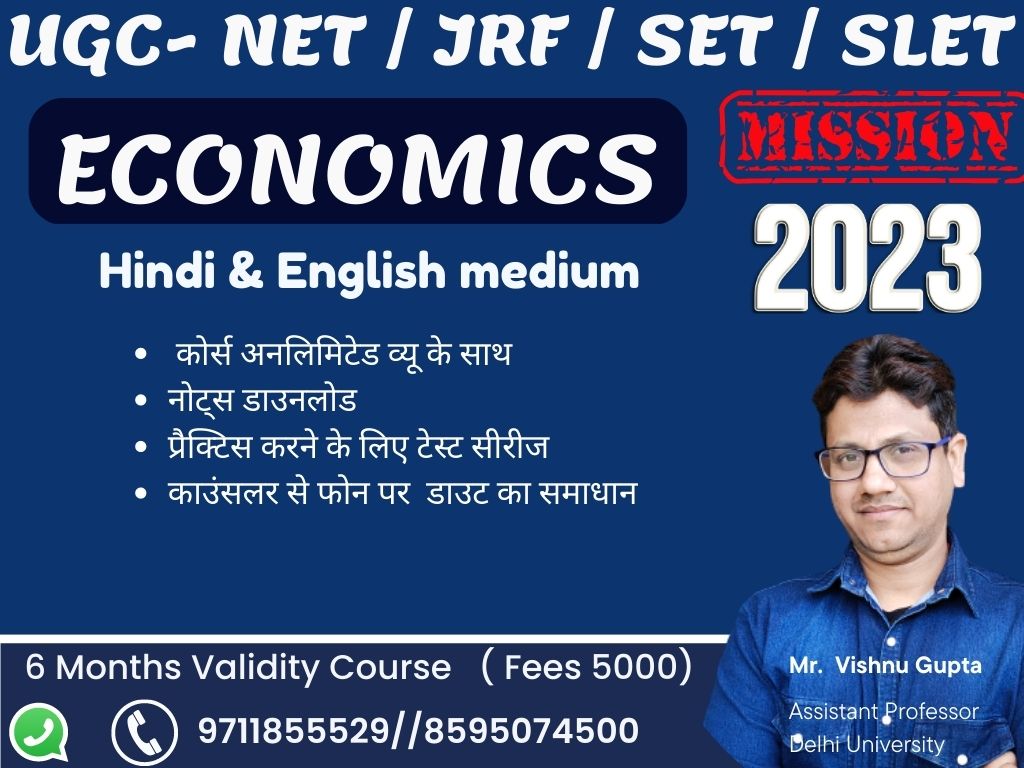
UGC NTA / SET/ NET Unit-1: Micro Economics Theory of Consumer Behaviour Theory of Production and Costs Decision making under uncertainty Attitude towards Risk Game Theory – Non-Cooperative games Market Structures, competitive and non-competitive equilibria and their efficiency properties Factor Pricing General Equilibrium Analysis Efficiency Criteria: Pareto-Optimality, Kaldor – Hicks and Wealth Maximization Welfare Economics: Fundamental Theorems, Social Welfare Function Asymmetric Information: Adverse Selection and Moral Hazard Unit-2: Macro Economics National Income: Concepts and Measurement Determination of output and employment: Classical & Keynesian Approach Consumption Function Investment Function Multiplier and Accelerator Demand for Money Supply of Money IS-LM Model Approach Inflation and Phillips Curve Analysis Business Cycles Monetary and Fiscal Policy Rational Expectation Hypothesis and its critique Unit- 3: Statistics and Econometrics Probability Theory: Concepts of probability, Distributions, Moments, Central Limit theorem Descriptive Statistics – Measures of Central tendency & dispersions, Correlation, Index Numbers Sampling methods & Sampling Distribution Statistical Inferences, Hypothesis testing Linear Regression Models and their properties – BLUE Identification Problem Simultaneous Equation Models – recursive and non-recursive Discrete choice models Time Series Analysis Unit-4: Mathematical Economics Sets, functions and continuity, sequence, series Differential Calculus and its Applications Linear Algebra – Matrices, Vector Spaces Static Optimization Problems and their applications Input-Output Model, Linear Programming Difference and Differential equations with applications Unit-5: International Economics International Trade: Basic concepts and analytical tools Theories of International Trade International Trade under imperfect competition Balance of Payments: Composition, Equilibrium and Disequilibrium and Adjustment Mechanisms Exchange Rate: Concepts and Theories Foreign Exchange Market and Arbitrage Gains from Trade, Terms of Trade, Trade Multiplier Tariff and Non-Tariff Barriers to trade; Dumping GATT, WTO and Regional Trade Blocks; Trade Policy Issues IMF & World Bank Unit-6: Public Economics Market Failure and Remedial Measures: Asymmetric Information, Public Goods, Externality Regulation of Market – Collusion and Consumers’ Welfare Public Revenue: Tax & Non-Tax Revenue, Direct & Indirect Taxes, Progressive and non-Progressive Taxation, Incidence and Effects of Taxation Public expenditure Public Debt and its management Public Budget and Budget Multiplier Fiscal Policy and its implications Unit-7: Money and Banking Components of Money Supply Central Bank Commercial Banking Instruments and Working of Monetary Policy Non-banking Financial Institutions Capital Market